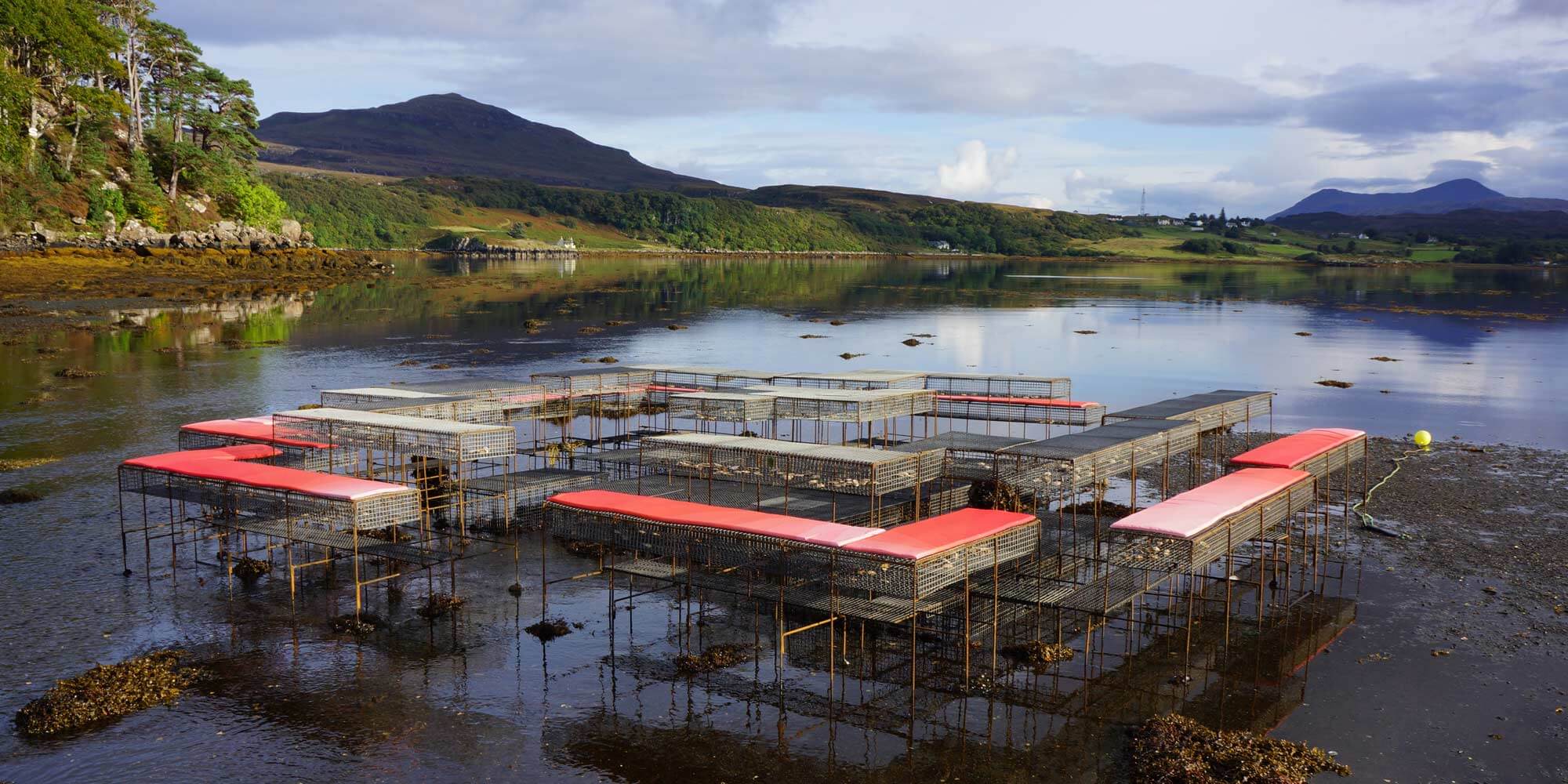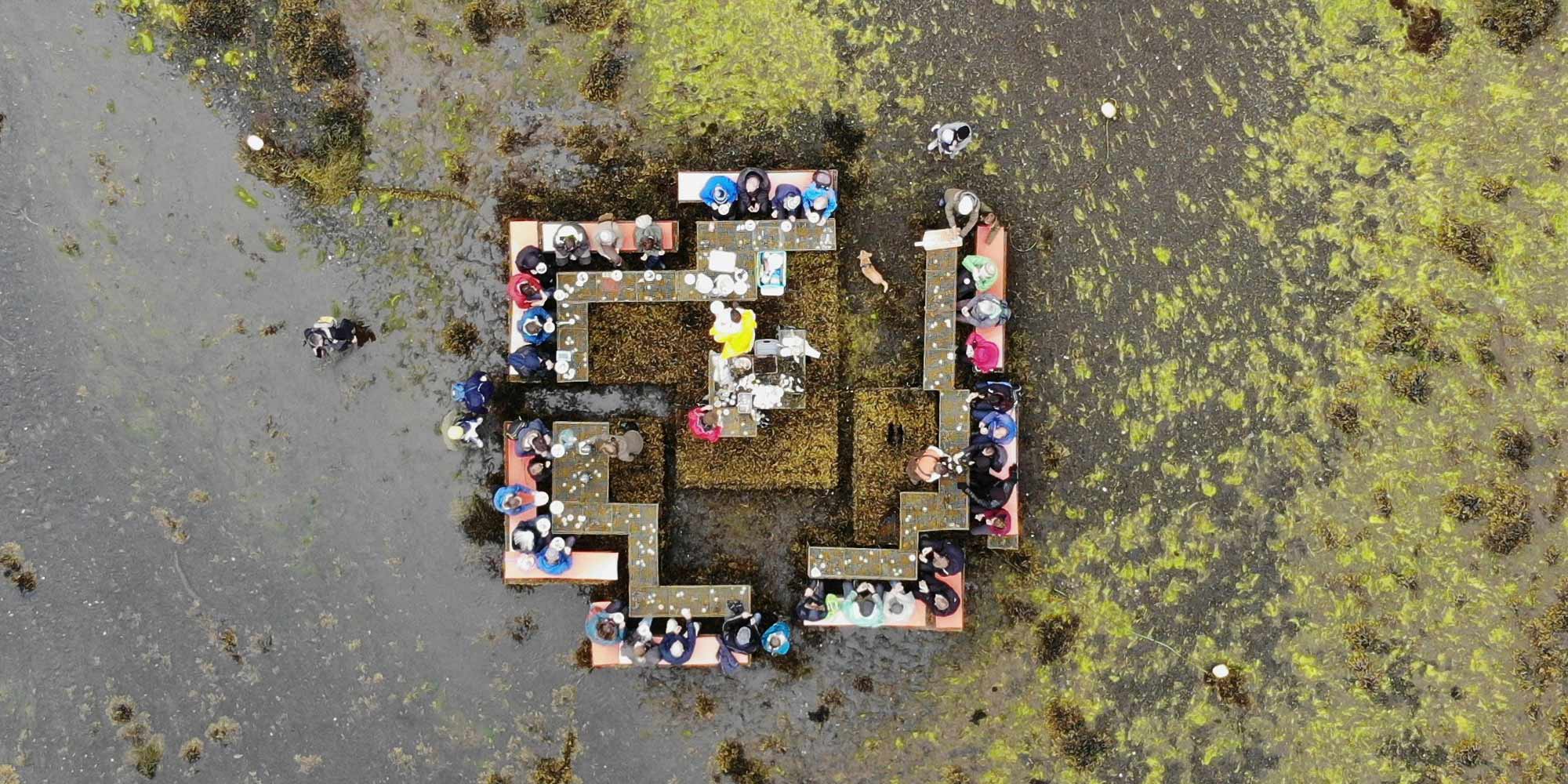Honorary Mention
CLIMAVORE explores how to eat as humans change climates (UNSDG 13). As spring, summer, autumn, and winter are increasingly fuzzy, it focuses on new seasons of polluted oceans, soil exhaustion, and drought. CLIMAVOREprotects and improves soil and water environments, advancing citizen’s right to food through regenerative food systems that cultivate habitats (UNSDG 11). Working with agronomists and engineers, CLIMAVORE has developed adaptive forms of eating, shifting to drought-resistant crops in water scarcity or filter feeders in polluted waters by fish farms.
In Scotland, the CLIMAVORE Station in Skye and Raasay works to transition from salmon farming to alternative aquacultures through new knowledge, establishing an internal market of coastal products. A new platform was built as an intertidal table: at high tide its bivalves and seaweeds oxygenated seawater; at low tide the table emerged above the sea as a dining table for humans. Over breakfast, lunch, or dinner (according to the tides), the structure was activated with residents, politicians, and researchers, re-connecting people with the coast while tasting ingredients that filter seawater by breathing (UNSDG 14). Collaborations with teachers, chefs, marine biologists, and stonemasons continue through cooking apprenticeships at the local high school and partner restaurants, a pilot for community-led intertidal seaweed and bivalve sea allotments, and a fabrication facility to make tiles out of oyster and mussel waste shells collected from restaurants (UNSDG 12).

CLIMAVORE runs similar replicable and scalable prototypes through artistic programs in Italy addressing drought, in Sweden addressing impacts of hydropower dams on wild salmon, in Istanbul coping with wetland draining, in the Alps facing exhausted monoculture prairies, and in Lake Erie addressing eutrophication. In parallel, it has also built an international network of art and cultural institutions that are adapting their menus to the climate crisis.
Credits
Cooking Sections: Daniel Fernández Pascual and Alon Schwabe
Studio team: Rosa Whiteley, Remi Kuforiji
Director of Care: Dani Burrows
Director, CLIMAVORE Station Skye & Raasay: Shona Cameron
Director, Becoming CLIMAVORE: Kelly Tsipni-Kolaza
Biography
Cooking Sections (INT) examines the systems that organize the world through food. Using site-responsive installation, performance and video, they explore the overlapping boundaries between art, architecture, ecology, and geopolitics. Established in London in 2013 by Daniel Fernández Pascual and Alon Schwabe, their practice uses food as a tool to observe landscapes in transformation. Their work has been exhibited internationally and Cooking Sections was nominated for the Turner Prize in 2021. They are Senior Research Fellows and Principal Investigators at CLIMAVORE x Jameel, Royal College of Art.
Jury Statement
How to eat as humans change climates? Cooking Sections’ project CLIMAVORE, conceived by Daniel Fernández Pascual and Alon Schwabe, does not merely intersect the realms of art, culinary practices, and environmental action but transcends them, redefining our societal understanding and interaction with our food and climate. The CLIMAVORE project responds dynamically to anthropogenic climatic events and landscape modifications, challenging large-scale agribusiness, and exposing the geopolitical implications behind climate alterations in an era where anthropogenic impact on food and the environment is increasingly pressing. It proposes a forward-thinking interpretation of food production and consumption, responsive to the evolving climatic phenomena. It magnifies the detrimental effects of carnivorous consumption on our planet and presents an opportunity to shift towards sustainable eating habits and environmental consciousness in food preparation and consumption. Cooking Sections has managed to create a distinctive art form, by instigating a conscious discourse on how our eating habits affect the climate and by making visible the potential of art as a catalytic tool for ecological and social change. By proposing the concept of “devouring” as a response to the anthropogenic impacts on landscapes, it illustrates how food itself can provide spatial and infrastructural solutions to climate alterations. This project encourages a flexible eating culture, adaptive to current environmental conditions, whether that be shifting to drought-resistant crops in times of water scarcity or relying on filter feeders in polluted or acidified waters. The influence of this project is far-reaching, impacting UK and European cultural institutions and beyond. The approach of Cooking Sections—a blend of art, cuisine, and ecology—is not just a work of art; it is a statement, a call to action, a new way of life.



